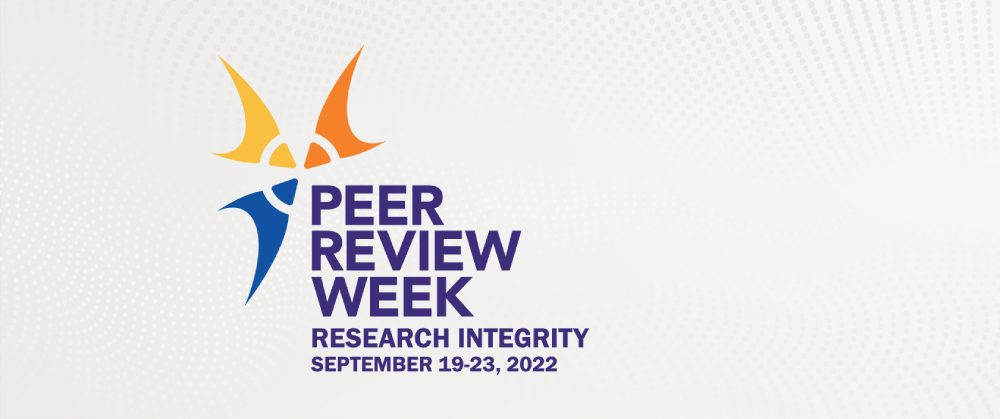The ASHA journals are proud to celebrate Peer Review Week once again this year, recognizing the importance of peer reviewers and the peer review process not only to ASHA but to the scientific community as a whole.
This year, the theme of Peer Review Week is “Research Integrity: Creating and supporting trust in research.” Peer Review Week 2022 Co-Chair Danielle Padula defines research integrity as “conducting research in a transparent, rigorous, and ethical manner that can be verified to the full extent possible, enabling others to have confidence in the methods and findings. Peer review standards are foundational to that and to creating a form of accountability” (Meadows, 2022).
In line with this theme, we’d like to share information about our peer review process as well as updates on initiatives to promote research integrity.
Peer Review at the ASHA Journals
A key focus of ASHA’s Ad Hoc Committee on Strategic Planning for the Journals Program was on research integrity. Every year, hundreds of editorial board members and ad hoc reviewers perform reviews for ASHA journals. These peer reviews shape “how researchers and the general public view individual studies and scientific research as a whole” because reviewers “vet research prior to publication and help correct the record when mistakes occur” (Peer Review Week, 2022). By adopting a structured, templated form of review process, the ASHA Journals sought to ensure greater consistency across reviewers and clearer expectations about the nature of the reviews sought.
In addition, we developed the ASHA Journals Academy to give authors a better sense of how their manuscripts would be handled and to give editors and reviewers better information and support for effective, high-quality review of a wide range of submissions. For example, sections on What to Expect in Peer Review and modules in the Peer Review Excellence Program as well as tools such as the EQUATOR-Network reporting guidelines help support authors’ increased clarity on manuscript requirements and reviewers’ understanding of how to best appraise various types of studies being reported.
Given the importance of peer reviewers in ensuring research integrity, ASHA journals are always seeking to expand the diversity of experience and expertise in editorial board members and ad hoc reviewers who participate in the peer review process. If you are interested in contributing to the scientific publication process, you can learn about the various editorial board roles, their duties, and recommended qualifications as well as submit an expression of interest online.
Transparency and Openness
ASHA has joined more than 5,000 other signatories in supporting the Transparency and Openness Promotion (TOP) guidelines. This means that we have established research data standards encouraging authors to share data and requiring them to provide a data availability statement (DAS) detailing where data supporting the results reported in the article can be found. In addition, all data, program code, and other methods referenced in articles published by the ASHA Journals should be appropriately cited in the text and listed in the References section.
The ASHA Journals have incorporated an array of processes and tools to increase transparency during the submission, peer review, and publication phases, such as the following:
- Welcoming submission of manuscripts that have been released as preprints on a preprint server, an individual website, or a required institutional repository
- Offering authors the Contributor Roles Taxonomy (CRediT) to promote integrity in scientific publication by providing insight into which author is responsible for which contributions
- Gathering financial and nonfinancial conflict-of-interest e-form disclosures from all authors
- Adopting the International Committee of Medical Journal Editors (ICMJE) authorship criteria
- Using iThenticate to check for plagiarism
- Providing an open access publication option with clearly defined licenses
These process-oriented elements that occur during submission into the peer review system are vital supports for research integrity because they help guard against research misconduct risks associated with the publishing-oriented incentive structures in academia.
Ultimately, increasing transparency in the research process and the reporting of studies improves the reproducibility of research by enabling others to gather enough information to allow for replication and validation, building trust in science. In addition, data sharing supports the creation of new science that is built on previous findings, making the research process more efficient.
Registered Reports
Registered reports are an important advancement in publishing—one that begins to address publication bias, questionable research practices, and the late influence of peer review. When authors begin work on a registered report, they submit their introduction, methods, and any pilot data before conducting any research. Then, after receiving any comments from editors or peer reviewers, they begin their research with one important caveat—their work will be published regardless of the results1.
Registered reports at JSLHR, along with other initiatives, represent an ongoing commitment to research integrity and finding solutions to problems inherent in a research and publishing landscape in which publications are such a high-stakes aspect of individual and institutional success (Storkel & Gallun, 2021). You can find out more about registered reports on the ASHA Journals Academy.
About Peer Review Week
We hope you enjoyed learning about the ways in which the ASHA Journals are supporting research integrity. You can learn more about this year’s theme, “Integrity in Peer Review,” via the official Peer Review Week theme announcement. And, in case you missed them, be sure to take a look at our previous posts about Peer Review Week to learn more about key developments in the ASHA Journals and in scholarly publishing at large.
Peer Review Week 2021: Identity in Peer Review
Peer Review Week 2021: Demographic Data Collection in ASHA Journals
Peer Review Week 2020 With the ASHA Journals: Trust in Peer Review
Celebrate Peer Review Week With Us! (Theme: Quality Peer Review)
The ASHA Journals Celebrate Peer Review Week (Theme: Diversity in Peer Review)
Four Easy Tips for Early-Career Researchers Interested in Peer Review
References
Meadows, A., Wallace, J., Vines, T., & Wulf, K. (2022). Announcing Peer Review Week 2022: An Interview with the co-chairs in The Scholarly Kitchen. https://scholarlykitchen.sspnet.org/2022/07/07/announcing-peer-review-week-2022-an-interview-with-the-co-chairs/
Peer Review Week. (2022). 2022 Theme Announcement: Peer Review Week 2022 explores the importance of peer review in supporting research integrity. https://peerreviewweek.wordpress.com/2022-edition/
Storkel, H. L., & Gallun, F. J. (2022). Announcing a new registered report article type at the Journal of Speech, Language, and Hearing Research. Journal of Speech, Language, and Hearing Research, 65(1), 1–4. https://doi.org/10.1044/2021_JSLHR-21-00513
1Provided that the final study conforms to the initially approved proposal and meets all quality checks.









